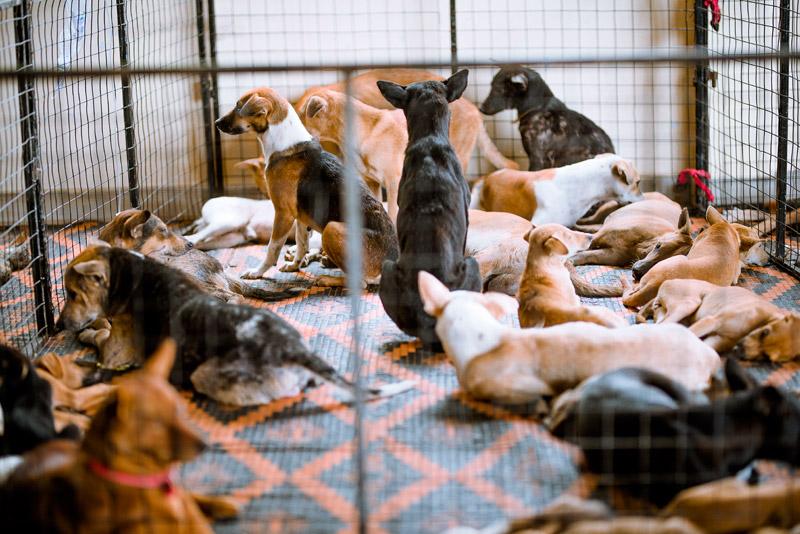27 Feb 2021 - {{hitsCtrl.values.hits}}

 The very concept of sterilization tends to cause controversies, due to the strong beliefs of the Sri Lankan communities which have long since sparked a relentless battle. The subject is so taboo that even amongst animal lovers, there are those who vocalize opposition as a result of being ill informed. From sweet elderly ladies chirping their two cents about sin and immorality, to fierce youths who debate about the right to life, there is but one answer to this vexed question. Sterilization is the only humane solution to stray population control.
The very concept of sterilization tends to cause controversies, due to the strong beliefs of the Sri Lankan communities which have long since sparked a relentless battle. The subject is so taboo that even amongst animal lovers, there are those who vocalize opposition as a result of being ill informed. From sweet elderly ladies chirping their two cents about sin and immorality, to fierce youths who debate about the right to life, there is but one answer to this vexed question. Sterilization is the only humane solution to stray population control.
A peek out the window is all it takes to understand the dire need for CNVR programs. Our parks teem with packs of dogs while kindles of kittens adorn our streets. Their coats, dusty and their stomachs, empty - the poor souls seek shelter at the foot of local kiosks and gratefully swallow the scraps served by pedestrians. Shunned to a humble living without food or shelter, whilst constantly being susceptible to abuse and vehicular accidents.
The significance of these programs can especially be seen in communities that are unable to afford the sterilization of their pets, let alone their community animals. A population growth so problematic that it’s a devastating thing to witness.
Sri Lankans mistake the sterilization of animals to be a sinful or immoral act. During the time in which I volunteered for Pet Adoption Days, I encountered countless individuals who refused to so much as glance at female puppies. Choosing to solely seek out the blue ribbons, they would say one of two things;
“Male pets have less needs” - This group of people actively chooses to adopt male pets, to avoid the burden of litters. In doing so, allowing their fertile male pets to freely roam the neighbourhood, impregnating stray female animals without having to feel accountable. And that’s just it - the supposed lack of responsibility which swiftly weighs into irresponsibility.
“I don't have the right to take away another's ability to give life” - This is the most frequent line I’ve come across. These folks are generally soft hearted individuals driven by faith or compassion. A majority of those I’ve had the pleasure of meeting have been the kindest of people who simply do not want to play a role in taking away the right to fertility. They’d clutch my arm or give me a sad smile as they proceed to confess. I would be lying if I said that they didn’t resonate with me.
They’d fall in love with the beautiful puppies in the pens, only to heave a sigh when they spot the red ribbon. Truly wanting to take the lovely pup home, but being unable to as a result of their moral compass. To these folks, this has always been my answer;
Sri Lankan cats and dogs endure an endless cycle of suffering. Male pets are preferred over females, due to homes not wanting to sterilize nor bear litters. This results in homeless female strays who are utterly vulnerable to being impregnated repeatedly by stray male animals and fertile male pets. As they bear litters, the male babes are preferred over the females and so, the dreaded cycle continues.
All stray animals, and even pets, must be sterilized regardless of their gender, if we are to have any chance of neutralizing the population and halting this suffering. It also plays a significant part in putting a stop to the atrocities of pedigree breeding and animal commercialization.
Sterilization is an act of a necessary evil. It is a deed we must do to put a stop to a cycle of endless suffering, as we alone have the power to do so.
I wish I could tell you that they all listened, understood and adopted the adorable female puppies. In a world that we can only hope to see as glass half full, I’m elated to tell you that some did.
Of course, this isn’t to neglect those who harm animal welfare by actively voicing their ill-formed opinions, and the ignorant who weren’t timely informed. Focusing on these stubborn outliers only derails our collective vision for animal welfare in Sri Lanka.
The animal welfare community tends to judge and accuse these groups of people. It’s important to remember that this is the product of culture, beliefs and the lack of education in regards to animal welfare. We know better. While anger may seem warranted, striving to, instead, educate and create more awareness about these issues will nurture the future generations in the right direction.
 Justice for Animals, consisting of Tashiya Captain and Yannina Captain - a mother and daughter duo, is an organization with a primary focus on CNVR programs. In the year 2020, they conducted a whopping 3,456 sterilizations islandwide, along with 4,169 anti-rabies vaccinations. Yannina was kind enough to give us some insights into the status of sterilization in Sri Lanka. Following are the excerpts:
Justice for Animals, consisting of Tashiya Captain and Yannina Captain - a mother and daughter duo, is an organization with a primary focus on CNVR programs. In the year 2020, they conducted a whopping 3,456 sterilizations islandwide, along with 4,169 anti-rabies vaccinations. Yannina was kind enough to give us some insights into the status of sterilization in Sri Lanka. Following are the excerpts:
During your time in the field, what has your experience been in regards to those who oppose sterilization?
Whilst there are still some who cling to misguided ideas and beliefs on sterilization, more and more people are beginning to accept that spay-neuter is the only humane way to reduce the population of homeless cats and dogs.
While many still prefer to adopt a male, this has more to do with the burden of responsibility of females having litters. Certain people, depending on which area you live in Sri Lanka, don’t have access to veterinary facilities, nor do they have the financial capacity. If females are sterilized, or a sterilization is promised once the dog is of suitable age, then it is more likely that females are adopted.
In your expert opinion, what needs to be done to control the growing stray animal population?
We advocate that both females and males must be sterilized. The government needs to step in and re-commence island wide sterilization programs. These programs must be undertaken in a systematic and strategic manner. Areas with large pockets of homeless animals must be revisited until there is a significant reduction. This means that ideally an area should have a program at least every 3-4 month so that animals that were too young or were missed at the previous program can be done before they start a new generation.
Several animal welfare groups and individual activists currently do spay-neuter programs but this is considerably inadequate, given that Sri Lanka has an estimated 1.5 - 2 million homeless animals.
There are constant requests for spay-neuter programs indicating an overall acceptance that this is the most humane way to control the population but animal welfare organizations do not have sufficient funds. We need substantial government support so that programs can be conducted in different population pockets simultaneously and repeatedly.
What words of wisdom can you offer to enlighten those who misunderstand the necessity behind Spay-Neuter programs?
For people who still believe that sterilization is 'wrong', we point out the alternative - a litter of puppies or kittens living a life of misery on the streets, most of whom will suffer and die. Those that do survive don't necessarily live full lives, and then in turn they have litters of their own and the cycle continues. Homeless animals become victims of hit-and-runs, become paralysed, succumb to diseases such as parvo and tick fever, starve to death, develop skin issues, etc. This is the fate that awaits them.
Justice for Animals relies solely on donations, volunteer work, and their own fundraising efforts to fund their CNVR programs. Make sure to support them via donations or by simply following them on their incredible journey across Sri Lanka.

09 Jan 2025 43 minute ago
09 Jan 2025 54 minute ago
09 Jan 2025 1 hours ago
09 Jan 2025 2 hours ago
09 Jan 2025 3 hours ago